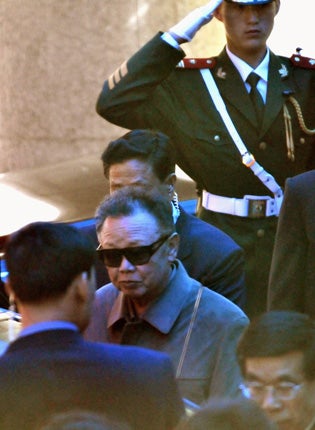Kim Jong-il goes in search of support with visit to old friend

Your support helps us to tell the story
From reproductive rights to climate change to Big Tech, The Independent is on the ground when the story is developing. Whether it's investigating the financials of Elon Musk's pro-Trump PAC or producing our latest documentary, 'The A Word', which shines a light on the American women fighting for reproductive rights, we know how important it is to parse out the facts from the messaging.
At such a critical moment in US history, we need reporters on the ground. Your donation allows us to keep sending journalists to speak to both sides of the story.
The Independent is trusted by Americans across the entire political spectrum. And unlike many other quality news outlets, we choose not to lock Americans out of our reporting and analysis with paywalls. We believe quality journalism should be available to everyone, paid for by those who can afford it.
Your support makes all the difference.North Korea's famously reclusive leader Kim Jong-il was in China yesterday looking for moral and financial support from the impoverished Communist country's only major ally, as the international community continues to shun the North over its efforts to build nuclear weapons.
Mr Kim's armoured train rumbled across the border into China at Dandong yesterday morning. Later in the day, Mr Kim, 68, wearing his trademark khaki jumpsuit and his Elvis-inspired quiff, was in a motorcade of 50 limousines and other vehicles which drove to the plush Furama Hotel in Dalian, one of the richer cities on the eastern coast of China.
The visit comes as tensions are ratcheted sky-high between the two Koreas over the sinking of a South Korean warship and the ongoing failure to resume long-stalled nuclear disarmament negotiations.
Korea-watchers will be looking to see whether Mr Kim, who is said to have suffered a stroke in 2008, is accompanied by his youngest son, Jong-un, who is being groomed for power.
Mr Kim has many bridges to build if he wants to get his country on track to being a functioning member of the international community, and any such efforts are likely to start in China.
China and North Korea are described as being "as close as lips and teeth". China backed North Korea with troops during the 1950-53 Korean War and food and oil from China is said to be the only thing keeping the North Korean government going.
As such, China has a fair amount of influence in North Korea, although it has also fallen victim to the regime's habit of making seemingly arbitrary decisions on matters of international policy. Mr Kim, safely ensconced in his armoured train, visited China four times in the past decade, but the last was in 2006.
However, Beijing is said to be irritated by a nuclear test last year, which took place without prior approval from the Chinese, and meant that China supported international sanctions against the impoverished North, a rare occurrence.
Fearful of a flood of refugees from North Korea, or even worse, of North Korea unifying with the South and creating a US-backed buffer state on its borders, China has traditionally agreed to help support the North Koreans when they come knocking in search of help.
The last time he was in China, Mr Kim examined the country's booming factories to see how he could implement some of China's reforms in his own country to prop up its struggling industrial infrastructure.
At that time, there were pockets of free enterprise in evidence in the country, but the economy since then has worsened considerably and is believed to be suffering terribly from the effects of United Nations sanctions over the country's nuclear weapons programme.
Dalian has transformed itself from an industrial monolith into a thriving city that presents itself as a place for Western companies to invest.
Mr Kim faced rare public anger at home over his government's botched currency reform aimed at regaining control over the economy late last year. Two senior finance officials were executed in March after Pyongyang redenominated its currency, the won, wiping out millions of residents' savings and causing social unrest.
The Chinese are likely to offer Mr Kim some inducements to get him to rejoin six-nation talks, featuring both Koreas, the US, Japan, Russia and China, which are aimed at finding a way of getting the North to ditch its nuclear weapons programme in exchange for financial and energy aid.
The talks are hosted by China, and form an important part of Beijing's aim to establish itself as a regional diplomatic force to be reckoned with, so the Chinese will not want the talks to fail.
Washington has made it clear that it sees North Korea's return to the six-party talks as a basic condition for continued dialogue with Pyongyang.
For its part, North Korea has said several times that it will not return to the talks unless Washington commits to the discussion of a peace treaty and the lifting of sanctions.
Any signs of North Korea trying to reach out, however tentatively, would be in vain if evidence comes out that North Korea sank the Cheonan, which went down on 26 March in a disputed maritime border area after an unexplained explosion. Forty-six South Korean sailors were killed.
Join our commenting forum
Join thought-provoking conversations, follow other Independent readers and see their replies
Comments